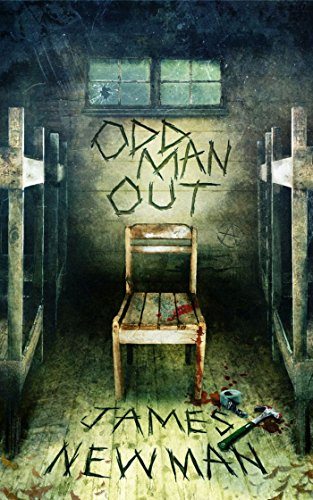Odd Man Out
James Newman
Bloodshot Books
2016
Reviewed by Michael R. Collings
James Newman’s short anatomy of hatred and fear, Odd Man Out, is a difficult book to categorize, beginning with the multiple ambiguities embedded in the title, which seems a bit trite until the possibilities implicit in each word, and in the phrase itself, trigger consequences almost beyond imagining.
On the base level, it is a rather single-minded tale of narrow-mindedness and intolerance that leads almost inevitably to a horrific conclusion, leaving none of the characters untouched. William Golding’s Lord of the Flies (1954) made small, it recounts seven days, not of creation but of disintegration, at the Black Mountain Camp for Boys when the narrator was fifteen. Nine teen-age boys, two young men, one woman—placed under the microscope of time and circumstance, examined and pushed to their limits, and, without exception, found wanting.
Due to an emergency, one of the boys and the adult couple in charge leave the camp; because of an even greater emergency they do not return, leaving the remaining campers in the charge of a college-age kid barely older than themselves. He is self-involved, narcissistic, only marginally aware of what his charges are doing among themselves and to themselves. Only at the end, when it is too late, does he make a serious effort to take charge of escalating threats and terrors…and then he makes things much worse. Throughout, he becomes an icon for disloyalty and betrayal, leading the way, as it were, for the younger boys.
Lacking an effective authority figure, the boys break down into a might-is-right society, rapidly choosing the weakest and most vulnerable as their primary, if not sole, target for their hatred. And here, Odd Man Out becomes an inordinately complex work, as it peels back the layers of insecurity—physical, emotional, spiritual, sexual—in characters in a confrontation that reveals who and what they are. The book has no true heroes; to one extent or another, each is warped by past or present fears, by false choices that lead to disasters, by inadequate preparation for a convoluted adult world. Physical prowess becomes sheer bullying; friendship and loyalty, luxuries to be ignored or discarded when threats escalate to actions. Language itself is called to account, as mindless epithets and invectives abruptly become horrifyingly literal.
Odd Man Out is a powerful book about a complex subject. It tells its story clearly and directly. It is simultaneously touching and terrifying in the simplicity of its narrative, its compression of time that highlights the rapidity with which evil actions can take over and destroy.
For me, the major weakness in the novel was the inclusion of an “Afterword” by the Reverend Amanda Hendler-Voss. In its emphasis on the sociological and theological implications of homosexuality and gender theory, and the contemporary jargons used to describe them, it seems to detract from the story already told by making its points explicitly and overtly, rather than organically, growing out of the actions of the characters and therefore more memorable and intrinsic. To an extent the story becomes a pamphlet, and adjunct to her philosophical stance; and that is a shame.
Even so, Odd Man Out is as suited to our times and needs as a society as Lord of the Flies was to the war-obsessed and war-terrified period of the 1950s. Both define worlds in which society, civility, and civilization itself are revealed as fragile, mere façade. And both create contexts in which all three are all-too-easily destroyed. Its narrative approach is similar; its attention to detail of character and action as convincing; and its final effect as chilling.









